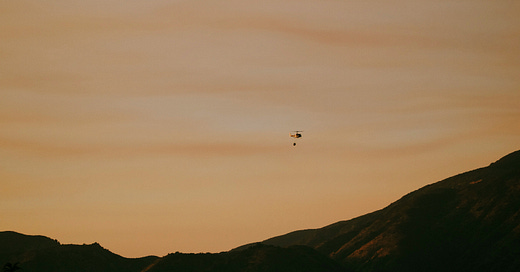everything's on fire (again)
As another disaster breaks the news, I'm reevaluating my media consumption habits for the new year
It’s been a strange start to this year, to say the least, but the tragedies remain the same. As probably most of you know, Los Angeles suffered some devastating fires in the past couple of weeks. And like all tragedies, the media doubled down and reported the hell out of it. Countless stories surfaced: of what was happening on the ground, updates on the destruction, profiles of people who’ve lost so much.
I used to think that it was my duty to read everything, since I, as a journalist, should be kept informed of all that happens. I took that duty seriously in 2024. But towards the end of last year, I could feel the doom-scrolling eroding my sanity — and more concerningly, warping my sense of reality. So in recent news cycles, instead of locking in, absorbing every piece of content that comes out of the news machine, I’ve tried stepping away.
Doing so has made me realize a couple of things. First, as a whole, the media is not real life. Real life, oftentimes, is hyperlocal: it’s mostly made up of interactions with your inner circle and tangible things like meals, health and commutes. But news, especially on a national or international scale, focuses on things that threaten the fate of humanity. Although that’s often good to know about, it tends to lean towards the things that people are drawn to click on: scandal, heartbreak, rage-inducing finger-pointing, disaster.
Which leads to my second point: To be informed on everything and anything via the news means that you learn about the worst and most click-worthy things about the world — all the time, all at once. It reminds me of some studies I’ve read in the past that say symptoms of PTSD can develop in content moderators, people who screen social media for content that is disturbing or violent. I wonder sometimes if that applies to the mountains of headlines and images that we see streaming out of outlets who compete with one another. Some days it feels like it does: When something especially harrowing happens, and I can do nothing but just scroll and hope that the next post will bring me some solace. (There’s probably research like that somewhere. If not, someone should study it.)
All that is to say, I’m trying to doom scroll less this year. And I think there’s a way to be an informed citizen without being chronically online. For me, this means limiting my exposure to breaking news, seeing just enough to know the big topics, but putting my efforts into reading long-form stories — magazine articles, books, deep dives into context and history. My 2024 reading list was a measly 7 books (!!) so we gotta do something about that.
I’m also trying to replace my scrolling habits with action, like donating to causes, getting involved with local initiatives, and talking with more people in my immediate community about their own experiences. None of those things are really happening online anyways, so it might be time to log off for a little bit and actually do things in real life. It would certainly, I hope, feel less chaotic.
From the reading list
Some places to donate to for the LA fires: Red Cross, California Community Foundation, Wildfire Relief
The Social Media Sea Change | Culture Study, Anne Helen Peterson - another perspective on being less chronically online
‘My life’s purpose’: A neuroscientist wants to rewire mental illness treatment and remake the field he loves | Usha Lee McFarling, STAT News - I love Usha’s work (she’s a journalist who focuses on health inequities.) This profile is no exception!
Strangers to Ourselves | Rachel Aviv - my current book read and possibly one of the best books I’ve read in a while. It follows the lives of five people that make you question the boundaries people often draw around mental illness and psychiatry.
No new stories from me, but I am currently working on a small book project. More on that later this year :)



